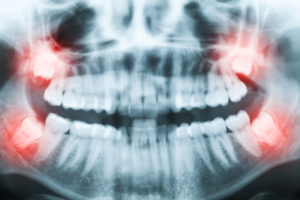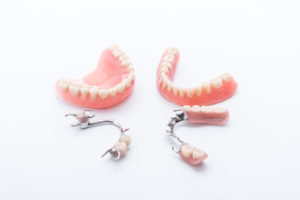
Wisdom teeth problems occur when the teeth are poorly aligned, or there isn’t enough room in the jaw for them to surface. Wisdom teeth are the last set of molars that develop in a person’s mouth, usually once the person is 17 or older. Wisdom teeth problems don’t occur if your jaw has enough room; they simply break through the gums and form normally.
A main occurrence when dealing with wisdom teeth problems is when they break halfway through our gums, and then a flap of skin grows over them. This could lead to a severe infection, especially if food particles get trapped within this skin overlap. Wisdom teeth problems also occur when they grow crooked or in the wrong direction. This causes your wisdom teeth to become impacted, meaning they are growing toward another tooth, which would cause your teeth to shift. If any wisdom teeth problems occur, they are usually treated by extracting the wisdom teeth.
Recognizing Common Symptoms of Wisdom Teeth Problems
Common symptoms of wisdom tooth problems are often easy to identify and address. One of the first signs is pain or stiffness near the back of your mouth, particularly around the wisdom teeth area. This discomfort may worsen as the tooth begins to push through the gums. Another symptom to watch for is irritation or soreness when your wisdom teeth rub against your tongue, cheek, or the roof and floor of your mouth.
This can happen as the teeth emerge, sometimes in awkward positions due to limited space in the jaw. If you experience any of these symptoms, it is important to consult a reputable dentist to evaluate the situation and prevent further complications. You should also consider that wisdom teeth problems can result in overcrowding, which may make you unable to properly brush and floss your teeth. This will result in poor oral hygiene, and you will have to face tooth decay or even gum disease.
To diagnose wisdom teeth problems, the dentist will examine your teeth and gums to start off to find any signs or symptoms of wisdom teeth problems. You may also be required to get an x-ray done to certify whether your wisdom teeth are causing any problems or whether there are likely to be any problems in the future. Sometimes, your dentist may recommend that your wisdom teeth be extracted even if you haven’t had any wisdom teeth problems. This is usually done to avoid any future problems.
Contact your dentist if you are feeling any irritation where your wisdom teeth would come in. They will give you further instructions on whether you should have your wisdom teeth extracted or if they will be fine to grow in.

